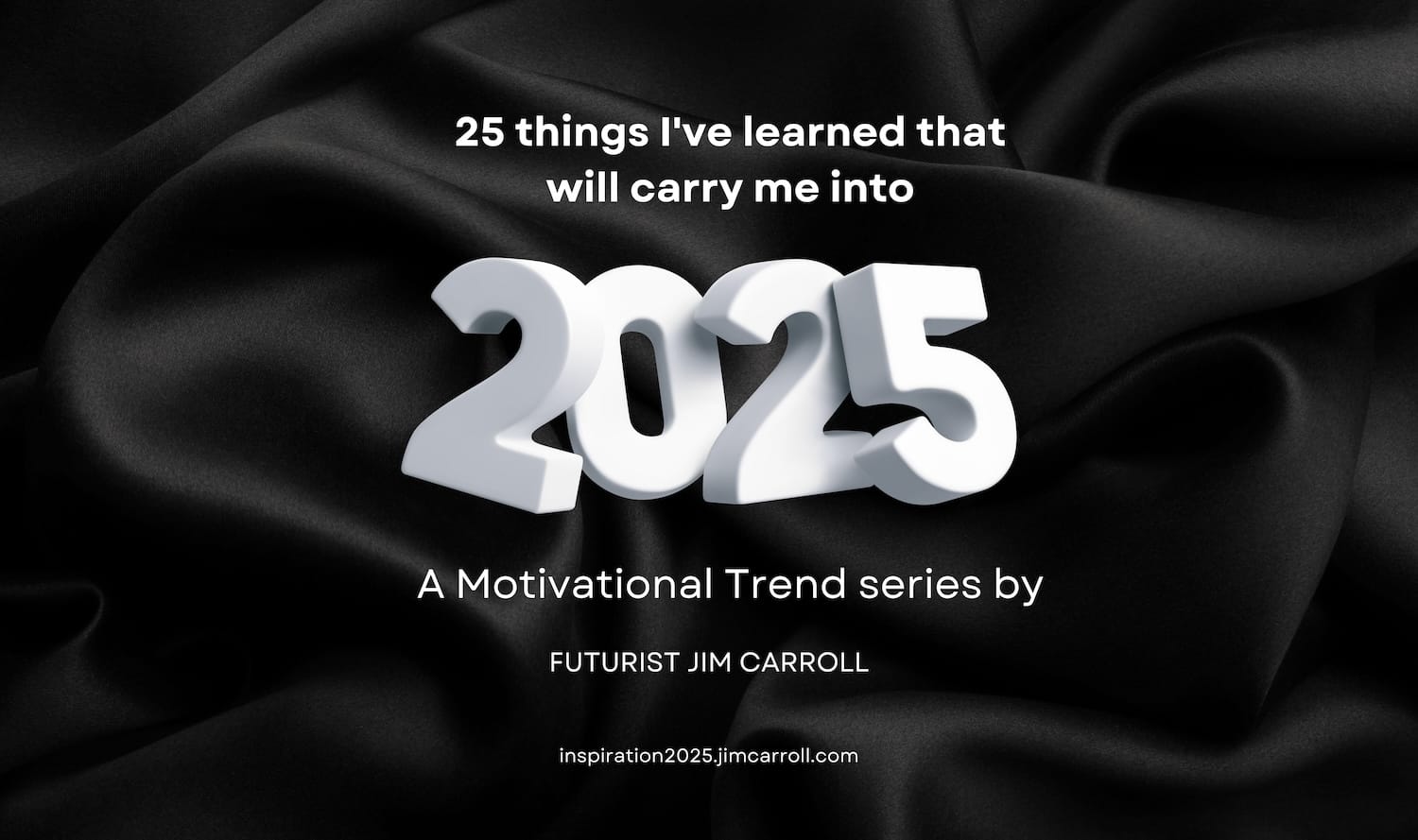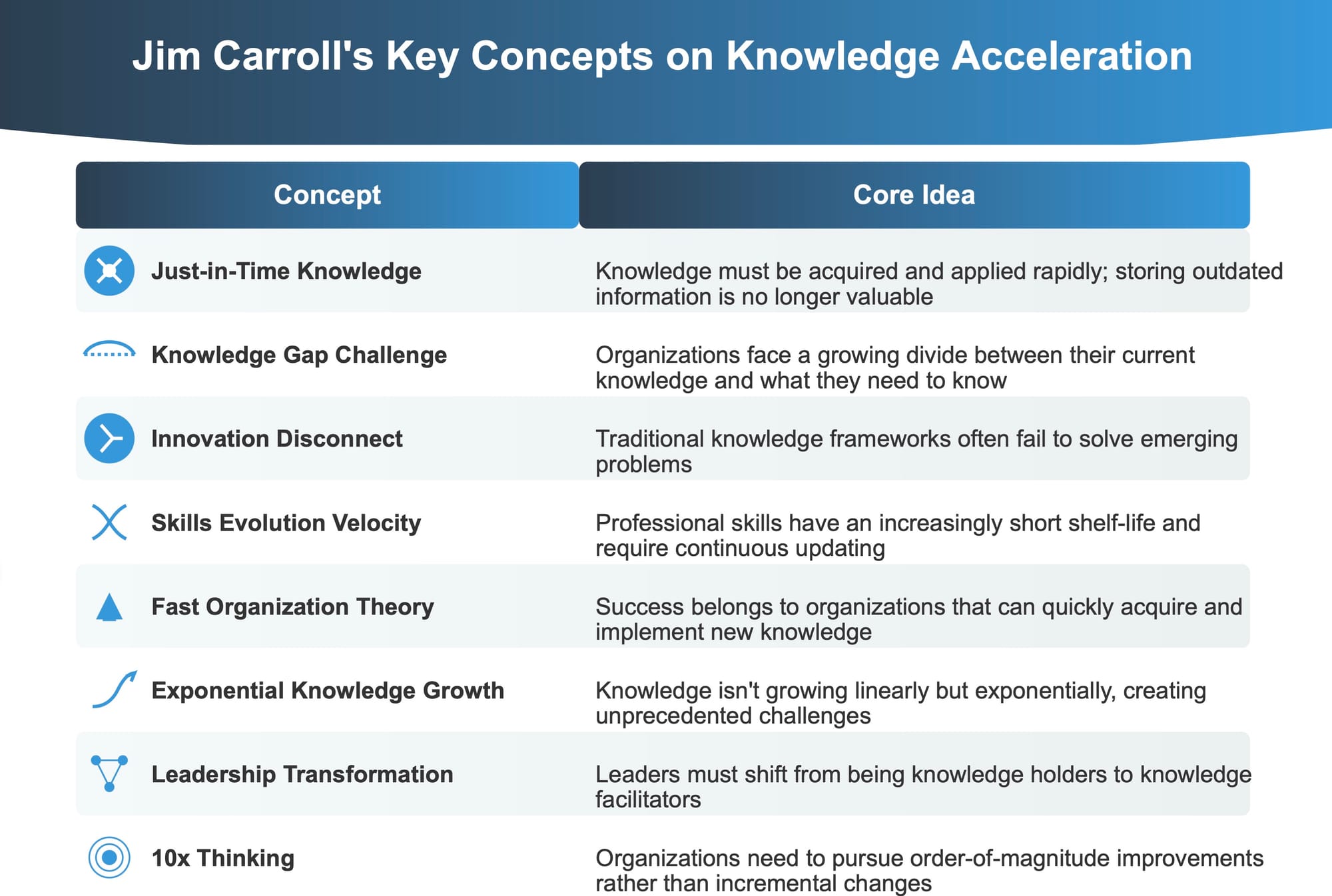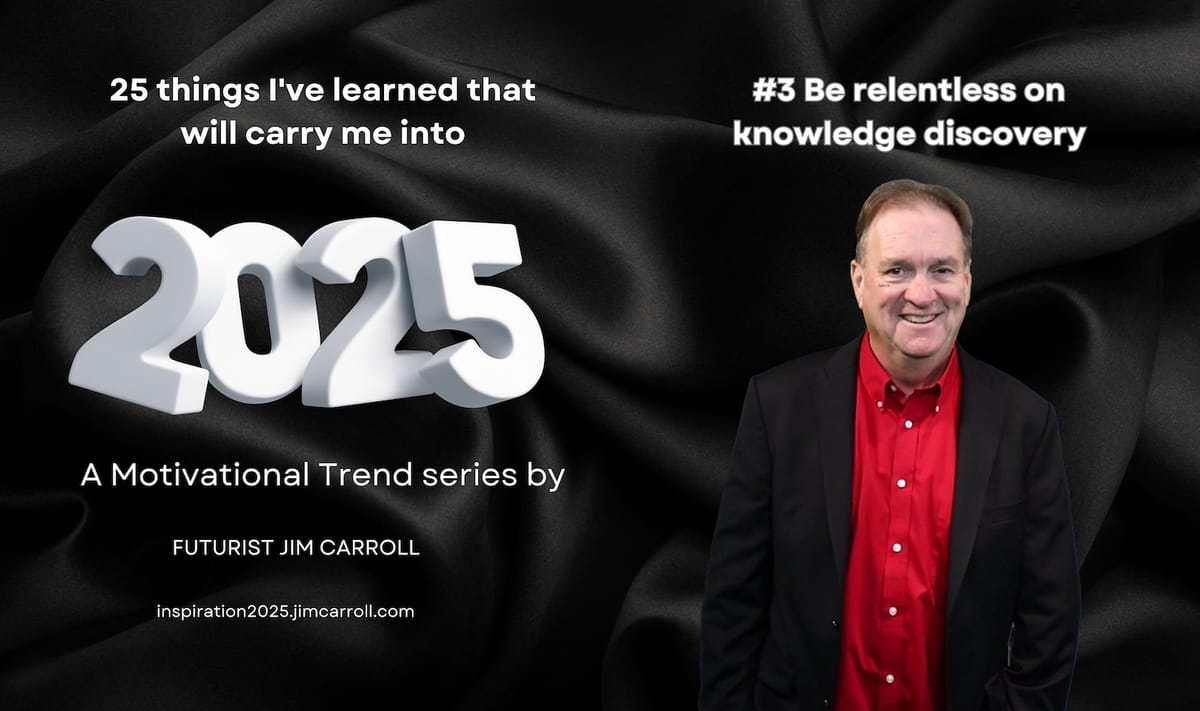"Be relentless on knowledge discovery" - Futurist Jim Carroll
Futurist Jim Carroll is writing a series, "25 Things I've Learned That Will Carry Me Into 2025." He is putting this together based on his 30-year career as a futurist, trends, and innovation expert, advising leaders of some of the world's most prestigious organizations on how to align to a faster future. He intends for the series to provide valuable guidance to others eager to learn how to move through a year that promises to be volatile, unpredictable, and full of uncertainty. Each day, the post will go out on multiple mailing lists, social media networks, and to the Website https://2025inspiration.jimcarroll.com

(I didn't like the image style I was using, so I've changed it!)
If there is one phrase that has guided me throughout my career, it's this one:
Learning is what most adults will do for a living in the 21st century.
Attributed to educator Lewis Perelman, it's a powerful way to summarize the reality for most people in this fast-moving world.
What I know about 2025 is that what I know right now won't be enough to chase the opportunities that might be in front of me tomorrow - I'll probably need new knowledge, new skills, and new insight. What I also know is that the growth of knowledge is relentless, that existing knowledge is fleeting, and that developing the ability to get the right knowledge at the right time for the right purpose is becoming more important than knowledge itself.
Hence, relentless learning and relentless knowledge discovery.
Some stats bear this out - I'm a sucker for insight on how quickly our world is changing:
- the total amount of digital data created worldwide doubled approximately every two years in the 2010s and early 2020s
- scientific research publications have been growing at a rate of about 8-9% per year, doubling roughly every 9 years
- in emerging technology fields like machine learning and genomics, the volume of research papers is doubling approximately every 2-3 years
- in many scientific fields, about half of what we know today was discovered in the last 15-20 years
- the average half-life of professional skills has dropped from about 10-15 years to 5 years, meaning skills learned today may be only half as valuable in 5 years
What does this lead to? Some studies suggest that most individuals need to learn 5-10 new skills every 3-5 years to remain competitive in their field, compared to the 1980s when the same number of new skills were needed over an entire career. That's because the reality is that it's challenging for everyone, but particularly for specialists, to stay up-to-date with all developments in their field.
The career impact? The World Economic Forum estimates each year, some 85 million jobs will disappear. Is that a harbinger of doom? Not at all - at the same time, 97 million new ones will emerge.
Reasons like this led me to become a knowledge enthusiast! I've equipped myself with some powerful knowledge tools to get by. One is my go-to research tool, Dow Jones Factiva, which I use for highly targeted and detailed searches that go far beyond the Web. I've mastered the art of high-speed knowledge acquisition through fast information scanning. I learn many new skills, particularly with technology, by 'geeking out' - installing new software, hardware, and tools regularly. (I've probably got close to two dozen computers of one sort or another in my home and chalet, all being used for various purposes.) And I'm accelerating my skills every day by continually learning to master all these new AI tools that are coming about.
That's because I see several powerful tools and issues related to knowledge acceleration at work.

Most important is the skill of "just-in-time knowledge," where the challenge isn't just acquiring information but staying ahead of its obsolescence. This involves plugging the knowledge gap - the widening gap between the knowledge we have and the knowledge we need. This gap is growing bigger as the world becomes faster. Then there is the innovation disconnect - organizations trying to get ahead with innovation but failing because they don't have the new knowledge they need to get there. Quite simply, we have to deal with the velocity of skills: the rapid emergence of new technologies means that skills that are in high demand today might become obsolete within a few years - so we all need regular skills replenishment and updating.
That's because the future belongs to those who are fast - and from that perspective, those who master fast new knowledge deployment are the ones who succeed. All of this means that leadership teams must move away from the core role of being a repository of knowledge to the role of being a knowledge facilitator - with the core skill being the creation of learning environments rapid learning and adaptation are possible. And this doesn't involve small, incremental steps - it involves 10x thinking - that's order-of-magnitude improvements rather than incremental changes.
This is not easy stuff - and that's one reason why there is such a social, political, and economic gap today between the educated and uneducated. Quite simply, many organizations and institutions are failing when it comes to knowledge acceleration, leading to some rather profound societal volatility.
I know I can't fix that other than telling the story of knowledge acceleration - but what I also know is that through 2025, one of my methods of getting through and getting ahead will be to continue to double down on my knowledge skills.
Oh, and that chart in today's post? That's a new knowledge discovery I just made, learning how to create such powerful insight tools using Claude AI.
Just in time knowledge.
It's the future of just about everything!
Futurist Jim Carroll often shares insight in his keynotes on the power of relentless learning.

